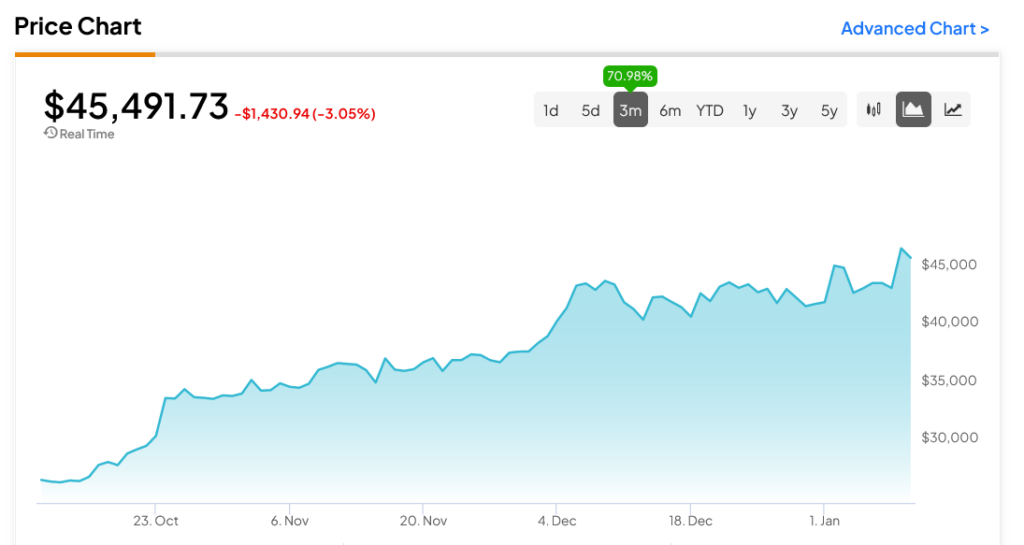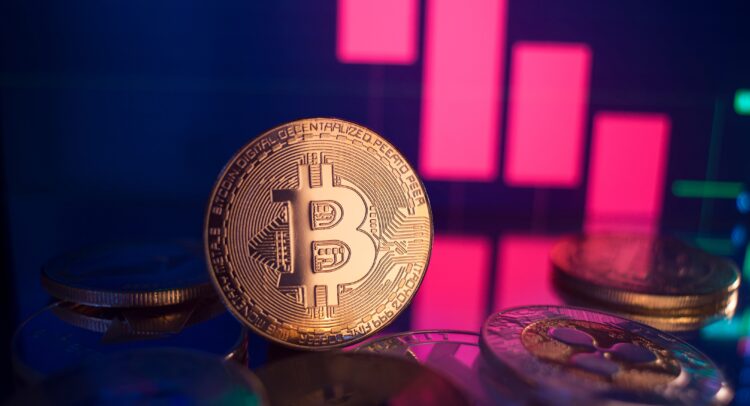When it comes to establishing a Bitcoin exchange-traded fund (ETF), it’s basically all over but the crying. The courts have removed the Securities and Exchange Commission’s (SEC) last objection, and the plans will, eventually, go forward. But what will such a plan do for the value of Bitcoin (BTC-USD)? What will it do for cryptocurrency in general? The news may not be as good as some hoped for, but it will likely be better than others expected.
Elevate Your Investing Strategy:
- Take advantage of TipRanks Premium at 50% off! Unlock powerful investing tools, advanced data, and expert analyst insights to help you invest with confidence.
For those not already familiar, a Bitcoin spot ETF will actually hold Bitcoin as its main asset. Spot ETFs are like gold funds or so-called “paper gold.” They allow investors to benefit from the gains and declines in price but without having to actually buy and hold the asset in question.
Given how difficult it can sometimes be to buy and hold Bitcoin—just ask anyone who had assets with Bittrex, Mt. Gox, or FTX—that can be attractive. But right out of the gate, that means at least one major new buyer for Bitcoin has emerged: the ETF. That should have an immediate, short-term impact on the price of Bitcoin, as Bitcoin is an inherently limited asset, which means scarcity effects kick in almost immediately.
The ETF is going to have to buy that Bitcoin from somewhere, and there’s a decent chance they’ll have to pay a premium to get it. It is possible they could mine it, but somehow, I doubt they’d mine their own. Some projections are looking for the ETFs to trade at about 8% higher than their net asset value (NAV), largely due to the premiums involved. The impact on Bitcoin itself has been substantial; when Blackrock (NYSE:BLK) applied for an ETF, Bitcoin prices went from $25,000 to $30,000 in just a few days.
A Longer-Term Mystery
Short-term, Bitcoin ETFs could definitely boost crypto prices as there will be at least one new buyer of Bitcoin. And it may not just be Bitcoin, either; look at the recent growth in covered-call funds focusing on certain stocks from YieldMax, like the TSLA Option Income Strategy ETF (TSLY). We might see future ETFs run a basket of cryptocurrencies, and that might get more speculators interested in buying ahead of an ETF launching such a strategy. We’ve also seen several competing funds getting ready for launch by staging “fee wars.”
But we may have a historical precedent to help us project Bitcoin’s value as the ETFs come online: gold. Back when gold ETFs were first established, in the early 2000s-era, prices tended to track ounces comparatively closely. Yet, when the ETF was announced, both gold holdings and prices shot up substantially until, ultimately, gold prices decoupled from gold holdings. It’s likely connected to the “paper gold” concept mentioned previously. Would Bitcoin have a similar effect? It’s reasonable enough; certainly, there would be a greater demand for Bitcoin, as the ETFs would need to hold it, but eventually, a similar decoupling effect would take place as the ETF becomes kind of a secondary demand platform.

Is Bitcoin a Buy or Sell?
In the end, we know that there will almost certainly be major new demand for Bitcoin in the near future, as a range of new Bitcoin ETFs will need to stock their coffers with the cryptocurrency. Indeed, the price of Bitcoin has jumped over 70% in the past three months in anticipation. There could also be a halo effect to other cryptocurrencies that may find themselves next on the menu as brokerages and other entities start offering more generalized cryptocurrency ETFs, similar to YieldMax. Nevertheless, Bitcoin will likely remain volatile. Thus, investors need to be willing to stomach the large swings.

















